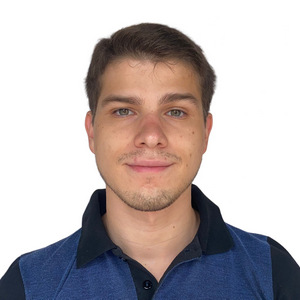Our testimonials: Vinicius

Our testimonials: Vinicius
Meet Vinicius from Brazil
Student of Medicine and Surgery
"Padova, even though it was founded more than 3 millennia ago, is a modern city and demographically young for having grown up around its eight-hundred-year-old university, being truly welcoming to foreigners"

About myself
I am Vinicius Lima dos Santos, a 20-year-old Italian-Brazilian student of Medicine and Surgery, coming from São Paulo - Brazil. Having chosen the University of Padova, a historical university internationally recognized for its scientific production, I use my time to continue shaping my scientific skills, focusing on international and humanitarian medicine, as envisioned by physicians such as Gino Strada, founder of the humanitarian non-governmental organization Emergency. To this end, I learned, during the summer course in Venezia offered by the universities of Padova and Strasbourg, about neuropsychology and alternative low-cost therapies involving meditation techniques. In addition, I use the university's Linguistic Centre to improve my fluency in Italian and English, given the variations in medical terminology in each language. In the future, I also desire to learn other languages as well, such as Russian and Arab, in order to better communicate with possible patients. To better prepare myself for my future profession, I use the opportunities offered by the School of Medicine to understand the life of a doctor, learning how to properly conduct a patient interview with real patients, and doing internships in hospitals, like in the Radiology department. I also think that to better understand patients and illness, it's necessary to understand the history of Medicine, which is intrinsically linked to the University of Padova, and its proof is, among many monuments and departments, the Morgagni Museum of Pathological Anatomy, managed by and for students that wish to further investigate illnesses that affected our ancestors, and with which I wish to collaborate.
What do you like most about the City of Padua and why? What fun things have you experienced since being here? This can include experiences outside the city e.g. travel to the rest of the Italy or Europe.
Padova, even though it was founded more than 3 millennia ago, is a modern city and demographically young for having grown up around its eight-hundred-year-old university, being truly welcoming to foreigners. As a university town, and a historic one at that, I have many possibilities of where to meet my friends and have fun, be it museums, historical buildings, cinemas, coffee shops (including the historic Caffè Pedrocchi, frequented by Stendhal, Lord Byron, Gabrielle D'Annunzio, Dario Fo and many others), or even go to other historically important cities of immeasurable beauty like Venezia, located a few kilometres from Padua, and where we can learn and admire the history of the region. Furthermore, I have the possibility to live in an international environment, with people from different parts of the world living or visiting Padova, and thus I can learn more about their cultures and traditions.
Culturally, I feel like I live in an open-air museum, always making new discoveries on my walks, like the houses where Napoleon Bonaparte, Wolfgang Amadeus Mozart, Galileo Galilei and others passed by. And, as a city with two UNESCO World Heritage sites, not only it is the culture abundant, but it is also affordable. Here I have the opportunity to attend music concerts, go to movie theatres, watch a theatre play while paying a low price or even for free.
Why studying in Padua?
The University of Padova has been in my dreams since 2014, when, at the age of 12, I first travelled to Italy and got to know Padova, a city older than Rome (756 BC) and Venezia (421 AD), being founded in 1185 BC by the Trojan prince Antenor. Now, after being admitted during the university's eighth centennial academic year (2022), I am in the same place where several of my medical idols studied or taught in, such as Andreas Vesalius, father of Modern Anatomy, Giovanni Battista Morgagni, father of Pathological Anatomy, William Harvey, who first described the circulatory system, Ludovico Brunetti, the physician-artist, Santorio Santorio, pioneer of studies on metabolism. Besides, of course, being in the same place as other idols, such as Nicolaus Copernicus, theoretician of heliocentrism, Galileo Galilei, one of the greatest scientists in history, responsible for starting the Scientific Revolution, father of the telescope and owner of one of the greatest minds that ever existed, Giacomo Casanova, the stud so well known that got a movie starring Heath Ledger, Elena Cornaro Psicopia, the first woman to graduate in history and many other incredible personalities who made history. It was here where Modern Western Medicine was born, where the great Pietro d'Abano founded the Sacro Collegio dei Filosofi e Medici (Sacred College of Philosophers and Doctors) in the XII century, where Girolamo Fabrici d'Acquapendent created the first fixed anatomical theatre (1594), and where Francesco Bonafede introduced the first university botanical garden (1545) in history.
Even today, UNIPD continues to be a reference in the whole world, being among the top hundred universities in rankings such as THE Impact Rankings, which recognizes the university's role in delivering the United Nations’ 17 Sustainable Development Goals, NTU Rankings, which certifies the productivity and quality of scientific production, and ranked among the top 100 in the world in 8 disciplines and in first place in Italy in 3 disciplines according to the QS World University Rankings.
MEET OUR TESTIMONIALS
Many students shared their experiences at the University of Padua.
Find out their stories!


